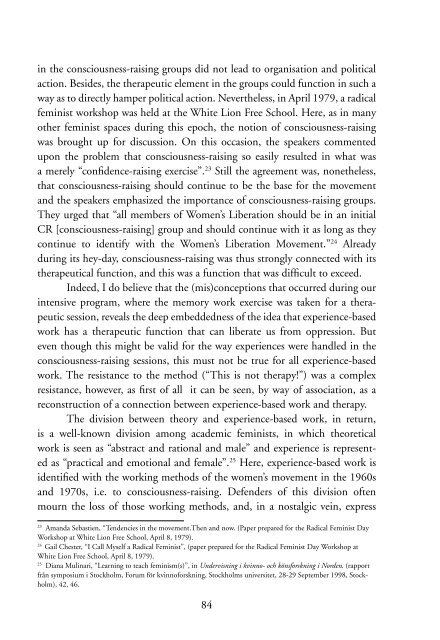Teaching with the third wave new feminists - MailChimp
Teaching with the third wave new feminists - MailChimp
Teaching with the third wave new feminists - MailChimp
Create successful ePaper yourself
Turn your PDF publications into a flip-book with our unique Google optimized e-Paper software.
in <strong>the</strong> consciousness-raising groups did not lead to organisation and politicalaction. Besides, <strong>the</strong> <strong>the</strong>rapeutic element in <strong>the</strong> groups could function in such away as to directly hamper political action. Never<strong>the</strong>less, in April 1979, a radicalfeminist workshop was held at <strong>the</strong> White Lion Free School. Here, as in manyo<strong>the</strong>r feminist spaces during this epoch, <strong>the</strong> notion of consciousness-raisingwas brought up for discussion. On this occasion, <strong>the</strong> speakers commentedupon <strong>the</strong> problem that consciousness-raising so easily resulted in what wasa merely “confidence-raising exercise”. 23 Still <strong>the</strong> agreement was, none<strong>the</strong>less,that consciousness-raising should continue to be <strong>the</strong> base for <strong>the</strong> movementand <strong>the</strong> speakers emphasized <strong>the</strong> importance of consciousness-raising groups.They urged that “all members of Women’s Liberation should be in an initialCR [consciousness-raising] group and should continue <strong>with</strong> it as long as <strong>the</strong>ycontinue to identify <strong>with</strong> <strong>the</strong> Women’s Liberation Movement.” 24 Alreadyduring its hey-day, consciousness-raising was thus strongly connected <strong>with</strong> its<strong>the</strong>rapeutical function, and this was a function that was difficult to exceed.Indeed, I do believe that <strong>the</strong> (mis)conceptions that occurred during ourintensive program, where <strong>the</strong> memory work exercise was taken for a <strong>the</strong>rapeuticsession, reveals <strong>the</strong> deep embeddedness of <strong>the</strong> idea that experience-basedwork has a <strong>the</strong>rapeutic function that can liberate us from oppression. Buteven though this might be valid for <strong>the</strong> way experiences were handled in <strong>the</strong>consciousness-raising sessions, this must not be true for all experience-basedwork. The resistance to <strong>the</strong> method (“This is not <strong>the</strong>rapy!”) was a complexresistance, however, as first of all it can be seen, by way of association, as areconstruction of a connection between experience-based work and <strong>the</strong>rapy.The division between <strong>the</strong>ory and experience-based work, in return,is a well-known division among academic <strong>feminists</strong>, in which <strong>the</strong>oreticalwork is seen as “abstract and rational and male” and experience is representedas “practical and emotional and female”. 25 Here, experience-based work isidentified <strong>with</strong> <strong>the</strong> working methods of <strong>the</strong> women’s movement in <strong>the</strong> 1960sand 1970s, i.e. to consciousness-raising. Defenders of this division oftenmourn <strong>the</strong> loss of those working methods, and, in a nostalgic vein, express23Amanda Sebastien, “Tendencies in <strong>the</strong> movement.Then and now. (Paper prepared for <strong>the</strong> Radical Feminist DayWorkshop at White Lion Free School, April 8, 1979).24Gail Chester, “I Call Myself a Radical Feminist”, (paper prepared for <strong>the</strong> Radical Feminist Day Workshop atWhite Lion Free School, April 8, 1979).25Diana Mulinari, “Learning to teach feminism(s)”, in Undervisning i kvinno- och könsforskning i Norden. (rapportfrån symposium i Stockholm, Forum för kvinnoforskning, Stockholms universitet, 28-29 September 1998, Stockholm),42, 46.84
















